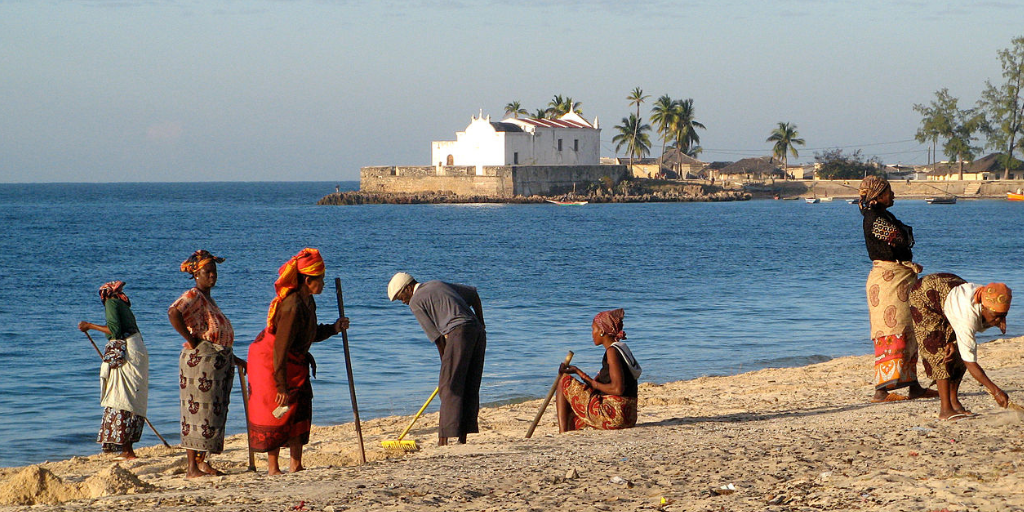
Beach cleaning at the Island of Mozambique near the Church of San Antonio, 2009. Photo by “Rosino“. Image cropped. Presented under CC BY-SA 2.0
Luize Guimaraes, Executive Director of MUVA in Mozambique, reflects on their recent transition from a programme team to an independent NGO. She talks to Paul Knipe about funding, organisational infrastructure, and the challenge of overcoming established ways of working and mindsets.
I first met Luize Guimaraes 18 months ago. At the time, MUVA, a social incubator focused on women’s economic empowerment, had started to transition from being an FCDO-funded programme to an independent NGO. Learning from transitions, responsible exit, and supporting guidance is increasing alongside efforts to localize and shift power. However, advice and experience remain in short supply. I was keen to reconnect with Luize to hear and share her story.
“MUVA was an OPM (Oxford Policy Management) programme with £19million from DfID [now the Foreign Commonwealth and Development Office or FCDO], designed to be a flagship learning programme on female economic empowerment. We were successful. We had started to have requests for MUVA to do more. NGOs and the private sector came to us asking for training and partnership. We saw the demand and decided to create a not for profit, to continue delivering MUVA,” Luize recalls. The plan was agreed. OPM amended the terms to ensure funding for programme delivery as well as for supporting the transition and, crucially, seed funding of about £3.5 million came from FCDO and the French Development Agency (Agence Française de Developpment, AFD).
There were challenges, of course. Many of these related to logistics and systems, which Luize refers to as organisational infrastructure. These needed to be set up while MUVA continued to deliver. “2020 was survival mode. 2021 and 2022 saw us building the infrastructure. We never stopped delivery, we increased our staff, we opened offices in the provinces. We continued to respond to demand”, Luize says. “MUVA had no hard infrastructure – no email, no server, no HR system, no accountancy system. We were a programme, relying on a company’s system and a brand. We had to create everything – legal, finance, IT. It did take money, time, and expertise.”
But there were other challenges, beyond logistics and systems. “It has been hard to shift from a project mindset to an institutional one,” she says. “We continue to do what MUVA did, but we needed to think about long term financial sustainability, clients. There’s a shift to the soul that should not be underestimated. Even with a social mission and being an NGO, you basically need to be able to run a business, otherwise you’ll crash and burn”.
Luize also feels that some partners changed their approach to working with MUVA, in a way that is at odds with efforts to shift the power. She worries that relationships built on trust are being eroded because MUVA had crossed over from being seen as a northern programme to being viewed as a southern organisation. “We worked successfully with an INGO for four years. When we changed, they started treating us like a small community-based organisation. The narrative changed to one of support and empowerment. They started telling us what we can and can’t do.”
Luize feels that relationships with donors have been hard, having significantly increased their reporting requirements and bureaucracy. “At some point we had an audit every two months and have had to forecast activities for the next two to three years. I don’t know how to operate like this. We’ve run things and been so successful over seven years, and it’s because of this success that donors provided support to create MUVA. They gave the funds but stripped us of most of the conditions that made MUVA’s delivery a success. Now we have such restrictive and detailed procurement plans and budgets as well as prescriptive donors telling us how we should be doing our job, who we should hire and how much we should or should not pay the staff. If they want the success that MUVA has been they must let us do our jobs.”
Despite the challenges, Luize and her team achieved system set up, registration, and expansion in only 18 months. What factors contributed to this success? “We were privileged”, she reflects. “We had funding, we had a strategy and mission, we had a theory of change. We didn’t lose capital as the entire team transferred.” Luize credits specific expertise that was brought in to provide advice, training and systems development. “What we needed was practicality – we needed systems, chart of accounts, procurement manuals, etc. All the unsexy nuts and bolts.”
And the future? “Now we have most of the systems, but we have about 20% still to do this year. We need to find donors that are genuinely interested in shifting the power and are keen to really learn how to improve female economic empowerment – not merely caring about number counting and upward accountability. Finding those partnerships is critical to enable us to operate, to carry out and design new approaches for economic empowerment. We will need them in order to test, to learn, and to keep the added value MUVA was created to bring to people we work with and the sector.”
Further reading
- Exiting / transitioning from international partnerships: a toolkit for small NGOs (INTRAC, toolkit)
- What working with EveryChild taught me about responsible exit (INTRAC, blog)
- Longitudinal Evaluation of EveryChild’s responsible exit process (INTRAC blog and Praxis Papers)
- Becoming Locally-Led as Anti-racist Practice’ Guide (BOND, practice guide)
- Locally led transitions in Development (Stopping as success, website)
- Re-inventing INGOs (RINGO) lab, including a recent “Fostering Equitable North-South Civil Society Partnerships: Voices from the South“ study
- Partos ‘Shift the Power Lab’ plus associated papers